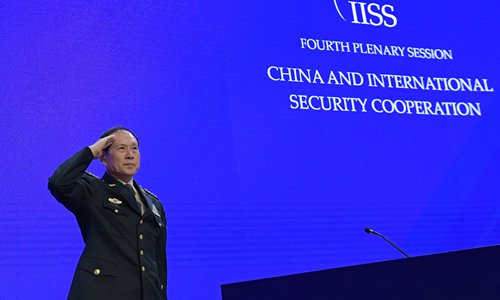Wei’s speech demonstrates China’s confidence
Tackling sensitive questions head on shows ‘frank’ image

Chinese State Councilor and Minister of National Defense Wei Fenghe salutes before addressing the Shangri-La Dialogue summit in Singapore on Sunday. Photo: AFP
The Chinese keynote speaker at the Shangri-La Dialogue in Singapore on Sunday stunned attendees by responding to questions about Taiwan, South China Sea and other sensitive issues, after a speech that showcased the full confidence of China and the Chinese military.
The speech and remarks by Chinese State Councilor and Minister of National Defense Wei Fenghe demonstrated China's strong determination to safeguard its sovereignty as he insisted "China must be and will be reunified" and "if anyone dares to separate Taiwan from China, the Chinese military has no choice but to fight at all costs for national unity."
Wei warned the Democratic Progressive Party (DPP) authorities and external forces that try to interfere in China's domestic affairs, saying no attempts to split China shall succeed and foreign intervention in the Taiwan question is doomed to fail. The DPP is a pro-secessionist political party in the island of Taiwan.
It was extremely dangerous to underestimate the determination and will of the Chinese military, Wei asserted.
"If the People's Liberation Army [PLA] cannot safeguard the unity of the motherland, what do we need it for?" he asked.
The minister's comments came as a response to remarks by US Acting Secretary of Defense Patrick Shanahan a day earlier, who said the US would continue to meet "obligations under the Taiwan Relations Act" to conduct defense cooperation with the island of Taiwan.
It was also a tough response to US provoking China on the Taiwan question, including sending naval vessels to the Taiwan Straits and passing acts in the US Congress to empower the US government to strengthen its connection with Taiwan secessionist forces.
Zhou Bo, director of the Security Cooperation Center of the Office for International Military Cooperation at China's Ministry of National Defense, told Global Times on Sunday that "Wei's attitude is firm. Taiwan question touches on China's core interests and Wei put it bluntly saying what do we need the PLA for if it cannot safeguard the country's unity? That means it is a self-evident question which needs no explanation."
Wei slammed the legitimacy of the US to interfere in the Taiwan question. "We took note that the US side mentioned the Taiwan Relations Acts in yesterday's speech. Is it of Taiwan or the US? Is it a Chinese law or an international law? We can find no justifiable reasons for the US to interfere in the Taiwan question by its domestic law."
Showing confidence
Foreign observers attending the conference told the Global Times that the Wei's remarks were tough, but very frank and outlined China's policy clearly.
Chinese experts said his remarks and performance showed the confidence of China and the Chinese military.
Setting aside the Taiwan question, Wei also mentioned the South China Sea, saying that the US was threatening security and stability, and China's construction of islands for self-defensive purposes were to deal with the threat from the US.
Wei said, "Where there are threats, there are defenses. In the face of heavily armed warships and military aircraft, how can we stay impervious and not build some defense facilities?"
Some observers from within the region found the statement powerful and convincing. Commodore Sadeed A Malik Kashir from the Karachi Council on Foreign Relations, a Pakistani think tank, said China had the authority to speak like this.
"Look at how many wars the US launched over the past decades" and "it might launch another war against Iran very soon," he said. China had not invaded anyone, Kashir said, and so "when Wei talks about regional peace and stability, he makes a stronger point than the US."
Wei also issued direct answers to questions about vocational and educational training centers in the Xinjiang Uygur Autonomous Region and "the June 4th incident."
When a question was raised about the political turmoil between spring and summer in 1989, whispers could be heard around the conference hall.
Wei quickly responded that since the incident passed 30 years ago, tremendous changes have taken place in China.
"The Central Committee of the Communist Party of China took decisive measures to cease political turbulence, and thanks to that, China has maintained stability," and "If you come to China, you will understand it," he said.
Pierre Noel, a senior fellow in economic and energy security at London-based International Institute for Strategic Studies, expressed his appreciation for Wei's speech, saying “he covered the difficult subjects and not avoid any of them. I think people like the fact that his speech was very frank.”
